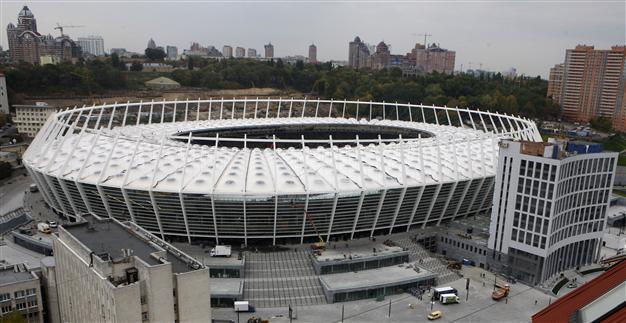Ukraine’s spending might become debt burden
KIEV - Reuters

This file photo shows the Olympiyskiy Stadium, which will host the Euro 2012 final. AP photo
Ukraine may never recover all of the billions of dollars it has spent to co-host the European football championship and the outlay might complicate its chances of servicing its debt.
The staging of the month-long Euro 2012 tournament - absorbing a total of $13.4 billion including $6.6 billion from state coffers - is unlikely to make the former Soviet republic any more inviting for foreign investment, analysts say.
And despite the hopes of tour operators and the authorities themselves, once the competition - taking place in four Ukrainian cities - is over and the fans have gone home, it is by no means certain that Ukraine will have registered itself as a new European tourist destination.
The mathematics of financing Euro 2012, being co-hosted with Poland, are crucial for a country which faces $11.9 billion in debt obligations this year, $5.3 billion of which is denominated in foreign currencies - making it sensitive to movements on foreign exchange markets.
The issue looms large as in June, the government has to repay a $2 billion loan to Russia’s VTB Capital and $500 million in outstanding Eurobonds.
“Ukraine will not receive any financial income or significant economic impact from co-hosting the Euro 2012 championship,” Andriy Kolpakov, managing partner at analytical group Da Vinci AG, said.
“And any possible improvement in image has run up against internal politics and the European Union’s reaction to it.”
Ukraine’s high level of corruption has scared off some foreign investors, while skyrocketing hotel prices have made many soccer fans either cut short their stay or skip it altogether and opt to follow their team’s fortunes on television.
Based on the government’s program, the state has spent some $6.6 billion from its budget on Euro 2012 preparations - a total which rises to $13.4 billion once input from state companies and private investors are included.
“In effect, the (state) budget took on the additional debt burden and taxpayers for many years to come will be paying for the Euro soccer holiday,” said Erik Nayman at brokerage Capital Times.
Analysts at Da Vinci forecast financial losses suffered from hosting the championship could total between $6 billion and $8 billion.
